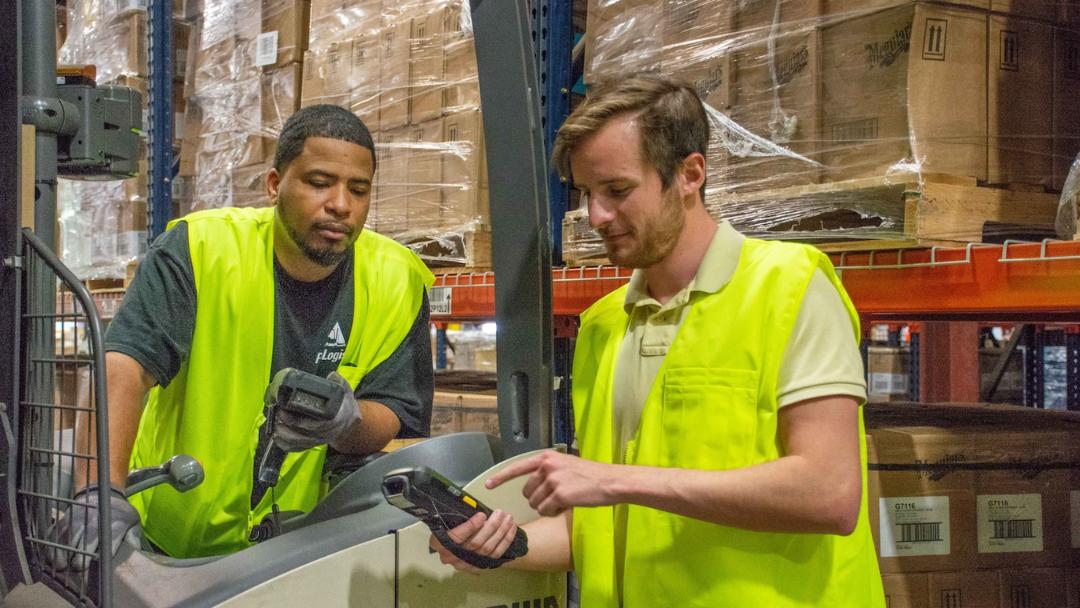Upskilling is more than just another internet buzzword. It's something you can offer your employees to continue their education and improve their skill levels. Keep reading to learn how to prepare your business for upskilling your teams and the benefits that come along with investing in your employees.
Define upskilling
What does upskill mean? Training employees beyond their job description in a new skill or method of working to benefit the company is the upskilling definition. Upskilling could include introducing a coding workshop or improving their programming skills because you have new supply chain software coming in.
Upskilling should not be confused as reskilling — although you could do either. Upskilling staff involves teaching an employee who already knows the basics of a job to improve their skills to reach a new level. Reskilling could be teaching an employee interested in learning a different job.
Learn more about our training and upskilling programs
Why upskilling is important
With robotics and big data filtering into the manufacturing industry, having a set of employees who can more easily navigate the changes can be extremely beneficial to your company. Instead of hiring new employees because of a skills gap, instead you can improve their competencies.
Employers can help develop an employee's career path so they have more options for movement instead of feeling like they need to find a new job to move forward. SHRM found that employees who don't have an obvious career path could be harder to motivate. On the other hand, employees who are passionate about a future with their employer value their job more and are more engaged.
Upskilling allows employers to experience less turnover, expanded growth opportunities and engaged, happy employees. This is a type of perk that many candidates are looking for because it gives them the chance to take charge of their careers and create more mobility from one job description to the next. It's a sign that a business invests in their employees rather than just using them to reach an arbitrary business goal.
Employers may even come to realize that their employees have interests outside of their current job description and could better benefit from their skills in another area of the business. An enhanced work-life balance offers the entire business more opportunities for growth.
Unexpected benefits of upskilling your employees
To explain why an upskilling training program is a worthwhile investment, let's explore a few of the benefits:
Fills gaps in labor
According to Deloitte, the American manufacturing industry is expected to have 2.1 million open positions by 2030. To start curbing this trend, it's important for manufacturers to start focusing on the talent they do have rather than fixating on the talent they don't.
By cross-training and reskilling, you can identify talents your employees probably didn't know they had. Better yet, you can maintain pace and keep productivity on track.
Improves employee confidence
To invest in your workforce through upskilling is also to empower them to perform as best they can. With the reassurance that a little – or a lot of – extra training can provide, your employees will gain the confidence to do their best. In fact, a study by TalentLMS found that 80% of workers agree that upskilling is a major boost to their confidence.
Prepares employees for the future
Automation is well on its way to becoming the standard for global manufacturing. But that doesn't mean the modern manufacturing worker will be needed any less.
In fact, they're likely going to be needed more. Automation may be able to streamline productivity and enhance workplace efficiency, but you still need someone with the skills to operate, maintain and teach that technology. Upskilling – especially the topic of automation – is how you help your employees make that transition and maximize their value to the company.
Provides your employees a chance to stay engaged
Doing the same thing every day gets boring – it's just a fact of life. It's important to keep your employees on their toes and engaged in their work. After all, studies show that engaged employees are happier in their jobs and often much more productive.
Break their cycle, shake up the routine and offer your workforce an opportunity to learn. Not only is it a chance to stay engaged, but it's also a much-needed break from the stresses of the job.
Attracts untapped pools of talent
Remember that thing about 2.1 million unfilled jobs? That's not going away – not if you don't upgrade your recruitment strategy.
Think about it: Upskilling, at the end of the day, is just another word for career development – something that millennials find extremely important. In fact, 91% of millennial professionals say that career progression is a top priority for choosing a new job. Flexing your company's ability to upskill and develop employees is an effective way to attract younger candidates to open positions.
Future-proof your workforce with upskilling
Offering your workers the opportunity to upskill through a learning and development program is a great way to ensure better employee retention, as well as provide a strong incentive for new candidates to want to work for you. Not only is it vital that you can upskill your employees to keep retention figures high, but it also means your business is future-proofed for changes in the industry.
Transform the workplace together
The digital transformation is well and truly underway, with many aspects of manufacturing becoming automated. But this doesn't mean human workers are becoming obsolete. In fact, quite the opposite. According to the World Economic Forum, top jobs for the next 10 years will rely heavily on human skills like communication and critical thinking.
To prepare for the future, manufacturers need to begin upskilling employees for those abilities, alongside the ability to use data-driven tools for analytics and planning. Include your teams in exploring innovations you can introduce to the workplace with their help, dispelling the misconception of robots replacing workers while giving your staff vital new skills.
Community college partnerships
Want to enhance the skills of your current workforce? Consider partnering with local community colleges that can offer courses to empower your teams to learn skills that will benefit both them and your operations. Most community colleges offer very flexible curriculums and class schedules, making them a perfect option for staff who are busy working through the day.
Engage and encourage your staff to pursue further education with your support and you will find those new abilities paying dividends when they begin to use them in the workplace.
Bring in new talent with high school apprenticeships
High schools are a largely untapped labor pool of highly capable candidates who can bring modern thinking and the latest in education to your workforce. The minimum requirement for most manufacturing jobs is a high school degree, so recruiting students to join your workforce once they graduate is a great way to motivate those who don't want to go to college to develop the skills that will benefit your operations.
According to the U.S. Bureau of Labor Statistics, only 61% of high school graduates aged 16 to 24 went on to college in 2021 — that leaves a huge number of graduates with a high skill set that could join your workforce. And bear in mind that current high schoolers are the most tech-savvy generation, so they'll be a perfect fit for the manufacturing workplace post-digital transformation.
Want to learn more about how we can help?


